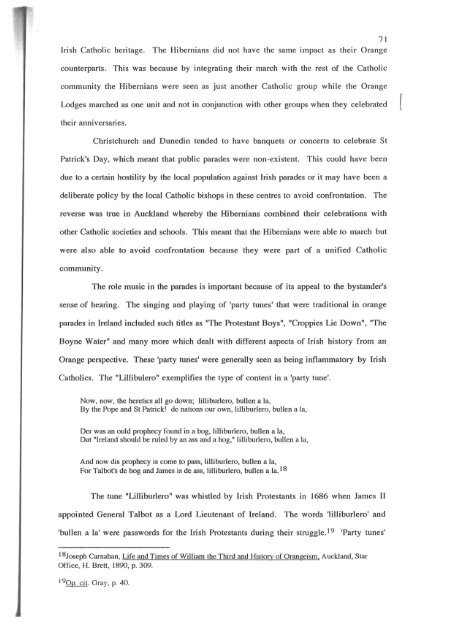TRANSPLANTED IRISH INSTITUTIONS - University of Canterbury
TRANSPLANTED IRISH INSTITUTIONS - University of Canterbury
TRANSPLANTED IRISH INSTITUTIONS - University of Canterbury
You also want an ePaper? Increase the reach of your titles
YUMPU automatically turns print PDFs into web optimized ePapers that Google loves.
71<br />
Irish Catholic heritage. The Hibernians did not have the same impact as their Orange<br />
counterparts. This was because by integrating their march with the rest <strong>of</strong> the Catholic<br />
community the Hibernians were seen as just another Catholic group while the Orange<br />
Lodges marched as one unit and not in conjunction with other groups when they celebrated<br />
their anniversaries.<br />
Christchurch and Dunedin tended to have banquets or concerts to celebrate St<br />
Patrick's Day, which meant that public parades were non-existent. This could have been<br />
due to a certain hostility by the local population against Irish parades or it may have been a<br />
deliberate policy by the local Catholic bishops in these centres to avoid confrontation. The<br />
reverse was true in Auckland whereby the Hibernians combined their celebrations with<br />
other Catholic societies and schools. This meant that the Hibernians were able to march but<br />
were also able to avoid confrontation because they were part <strong>of</strong> a unified Catholic<br />
community.<br />
The role music in the parades is important because <strong>of</strong> its appeal to the bystander's<br />
sense <strong>of</strong> hearing. The singing and playing <strong>of</strong> 'party tunes' that were traditional in orange<br />
parades in Ireland included such titles as "The Protestant Boys", "Croppies Lie Down", "The<br />
Boyne Water" and many more which dealt with different aspects <strong>of</strong> Irish history from an .<br />
Orange perspective. These 'party tunes' were generally seen as being inflammatory by Irish<br />
Catholics. The "Lillibulero" exemplifies the type <strong>of</strong> content in a 'party tune'.<br />
Now, now, the heretics aU go down; lilliburlero, bull en a la,<br />
By the Pope and St Patrick! de nations our own, lilliburiero, bullen a la,<br />
Der was an ould prophecy found in a bog, lilliburlero, bullen a la,<br />
Dat "Ireland should be ruled by an ass and a hog," lilliburlero, bull en a la,<br />
And now dis prophecy is come to pass, lilliburlero, bullen a la,<br />
For Talbot's de hog and James is de ass, lilliburlero, bull en a la IS<br />
The tune "Lilliburlero" was whistled by Irish Protestants in 1686 when James II<br />
appointed General Talbot as a Lord Lieutenant <strong>of</strong> Ireland. The words 'Iilliburlero' and<br />
'bull en a la' were passwords for the Irish Protestants during their struggle. 19 'Party tunes'<br />
ISJoseph Carnahan, Life and Times <strong>of</strong> William the Third and History <strong>of</strong> Orangeism. Aucldand, Star<br />
Office, H. Brett, 1890, p. 309.<br />
190p. cit. Gray, p. 40.
















